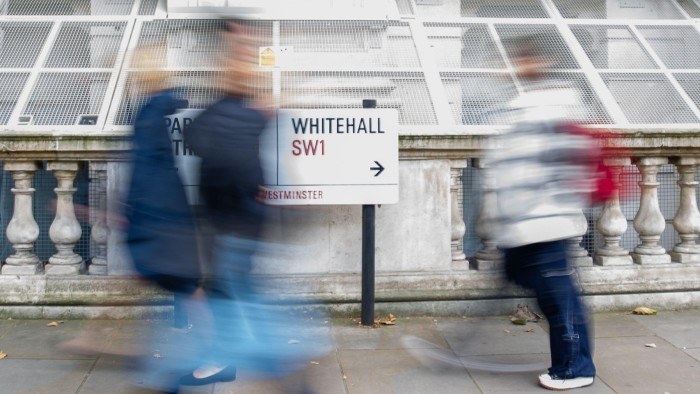Unlock the Editor’s Digest for free
Roula Khalaf, Editor of the FT, selects her favourite stories in this weekly newsletter.
Several of Whitehall’s largest departments reported wider gender pay gaps last year, despite an overall narrowing in the amount men in the civil service are paid over their women colleagues.
The Department of Health and Social Care recorded the largest rise of any ministerial department from 9.1 per cent in 2023 to 13.9 per cent in 2024. The ministry employs about 10,500 people.
The Department for Education, which has 8,600 staff, had the second largest increase from 4.1 per cent to 8.2 per cent.
Both departments registered the largest difference in median pay between men and women since the government introduced mandatory reporting for large employers in 2017.
Across the entire civil service the median gender pay gap decreased from 9.6 per cent in 2023 to 8.5 per cent in 2024, still higher than the UK average of 7 per cent.
The Foreign, Commonwealth and Development Office, employing 9,435 people, had the steepest drop of 6 percentage points to 2.7 per cent.
Ann Francke, chief executive of the Chartered Management Institute, said closing the pay gap was a key part of driving public sector productivity growth.
“At a time when some organisations are scaling back diversity and inclusion efforts, government needs to lead by example and champion women in the workforce,” she added.
Prime Minister Sir Keir Starmer has pledged to reform the “flabby” British state by forcing out underperforming civil servants as part of a drive by the Labour government to boost public sector efficiency.
Enduring gender pay disparities in Whitehall reflect low female representation in senior roles and over-representation in junior positions. According to official figures, 62 per cent of the lowest-paid civil servants and 48 per cent of the highest-paid were women in March 2024.
“This data was under the previous administration,” said the Cabinet Office. “We know there is more work to be done, and we are fully committed to ensuring all civil servants are treated fairly.”
There is slow progress towards gender pay equality across the UK economy due to a lack of female representation in senior roles and an unequal distribution of caring responsibilities, with previous FT analysis showing it will take decades to reach pay parity at the current rate.
The government has outlined plans to increase scrutiny by making companies publish gender pay gap action plans in a bid to boost economic growth by improving employment outcomes for women.
Francke said strengthening reporting requirements would ensure pay gap reporting was “more than an annual tickbox exercise”.
“We need to see enforceable commitments to training and developing managers to help get this right,” she added. “Increasing representation of women — especially at senior levels — is not a nice to have, but a critical part of delivering a modern, growth-focused economy.”
Additional reporting by Clara Murray





1 Comment
g6rrz0